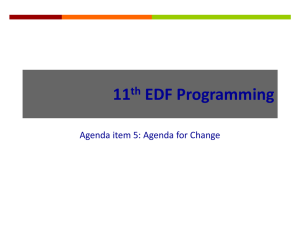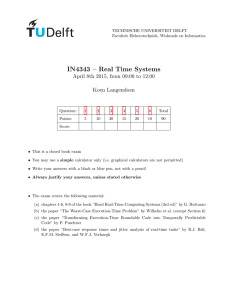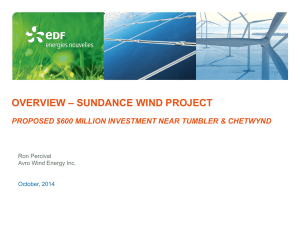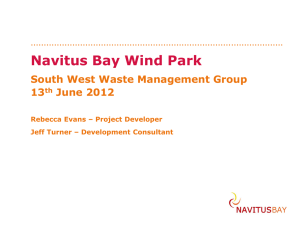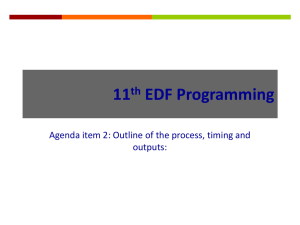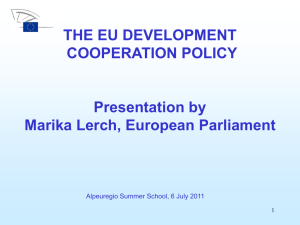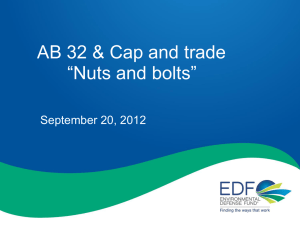EDF STRATEGY 2016-2019 Consultation with members and
advertisement
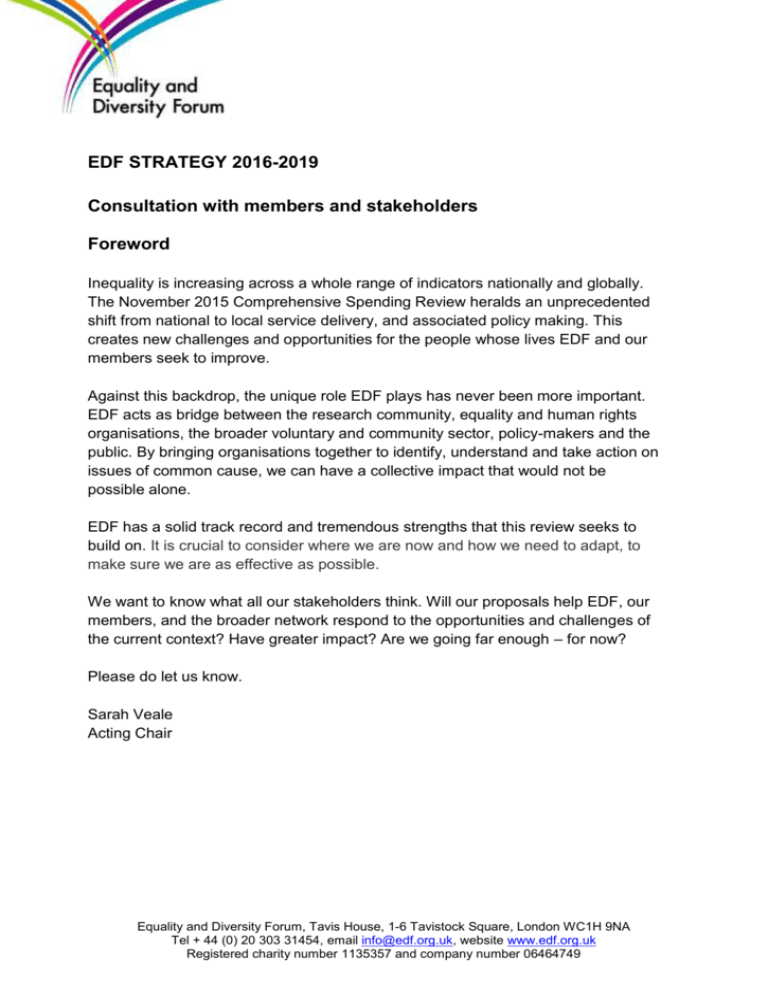
EDF STRATEGY 2016-2019 Consultation with members and stakeholders Foreword Inequality is increasing across a whole range of indicators nationally and globally. The November 2015 Comprehensive Spending Review heralds an unprecedented shift from national to local service delivery, and associated policy making. This creates new challenges and opportunities for the people whose lives EDF and our members seek to improve. Against this backdrop, the unique role EDF plays has never been more important. EDF acts as bridge between the research community, equality and human rights organisations, the broader voluntary and community sector, policy-makers and the public. By bringing organisations together to identify, understand and take action on issues of common cause, we can have a collective impact that would not be possible alone. EDF has a solid track record and tremendous strengths that this review seeks to build on. It is crucial to consider where we are now and how we need to adapt, to make sure we are as effective as possible. We want to know what all our stakeholders think. Will our proposals help EDF, our members, and the broader network respond to the opportunities and challenges of the current context? Have greater impact? Are we going far enough – for now? Please do let us know. Sarah Veale Acting Chair Equality and Diversity Forum, Tavis House, 1-6 Tavistock Square, London WC1H 9NA Tel + 44 (0) 20 303 31454, email info@edf.org.uk, website www.edf.org.uk Registered charity number 1135357 and company number 06464749 To respond The consultation is open to members, associate members, observers, stakeholder organisations and interested individuals. Please complete the short survey by 14 January 2016. Alternatively, you may feed in your views at the January forum meeting. We will also meet some individual stakeholder organisations. Context We are consulting on our strategy for 2016-19. The context is shaped by The recession and the subsequent recovery, the UK government’s spending reduction targets in response to the deficit, and protection of spending on health, education and international development, and the Scottish and Welsh governments’ pledges to protect key public services such as health. Demographic changes, including the effects of the global refugee and migration crisis and related debate, and our ageing and increasingly diverse population. Increasing devolution at national level to Scotland and Wales, and regionally and locally within England. The threat to continued membership of the EU. The Government’s equality and human rights agenda including proposed replacement of the Human Rights Act with a Bill of Rights; and stated aim of ending discrimination The 8 key challenges in the EHRC’s Is Britain Fairer? report. Internal factors including a more challenging funding environment for all NGOs. EDF’s increased activities and how to effectively coordinate and integrate them. Vision and strategic goals EDF’s board reviewed our vision and three strategic goals in January 2015, and again in the post-election environment in October 2015. We believe they remain fit for purpose and are not proposing to change them. EDF’s vision is of a society in which everyone can fulfil their potential and make a distinctive contribution diversity is celebrated, people can express their identities free from the threat of violence and everyone is treated with dignity and respect your chance to flourish is not limited by who you are or where you come from. Equality and Diversity Forum, Tavis House, 1-6 Tavistock Square, London WC1H 9NA Tel + 44 (0) 20 303 31454, email info@edf.org.uk, website www.edf.org.uk Registered charity number 1135357 and company number 06464749 Our three strategic goals are: 1. To build greater consensus on the value of equality and human rights in Britain. 2. To make a reality of equality and human rights by informing policy and practice. 3. To build the capacity of the voluntary and community sector to advance equality and human rights. Priority topics EDF has an essential role to play in bringing people together, across sectors and disciplines, and foster understanding and action across the full equality and human rights spectrum. We will continue to fulfil this role through forum meetings, our digital offer, research and knowledge exchange activities, the APPG on Equalities, etc. However, the urgency of the agendas and the need to have a meaningful impact, all within constrained resources, indicate the need for a tighter focus on a limited number of priorities at any given time. These priorities will be reviewed regularly, and as noted we will retain some capacity for broader, responsive work. However, we believe that bringing our resources together – and working collaboratively with others – around a limited number of priority topics in a strategic way is an important shift we need to make at this point. It will obviously be essential that the issues chosen reflect what members and associates need from EDF, considering the following criteria: What we as EDF are best placed to do, and where we can add value. Where there are significant opportunities to influence and achieve change, with and on behalf of members. What members want EDF to do, and our capacity to deliver effectively. The selection of issues will be influenced by the findings of the EHRC’s Is Britain Fairer? review published in November, Ministerial and Government Equalities Office priorities, and the Comprehensive Spending Review. We are consulting on this change in approach, which issues should be prioritised for focused activity under the new operating model (see below), and what EDF should do in each space. We have identified potential priority topics, from the input from EDF members at the May and October 2015 meetings. Equality and Diversity Forum, Tavis House, 1-6 Tavistock Square, London WC1H 9NA Tel + 44 (0) 20 303 31454, email info@edf.org.uk, website www.edf.org.uk Registered charity number 1135357 and company number 06464749 a. Human rights: We will continue to focus on building greater public support for human rights; and preserving the Human Rights Act, the rights it enshrines, and the supporting mechanisms. b. Developing progressive equality narratives, and supporting the sector to use them. This would help protect the sector’s voice and agency. It would strengthen the network’s impact by adding strategic communications on equality, human rights and social justice to EDF’s core activities, joining it up with our research and policy influencing work – see the section below on the operating model. This would enable our members and their members in turn to share and develop influencing skills and strategic communications skills (including framing and messaging) that work in the current context. build capacity to collaborate on a cross-strand basis. c. The cumulative and combined impacts of austerity (including welfare, social care and legal aid) across the protected characteristics: identifying and quantifying the impacts and telling the human stories. d. Access to Justice: ensuring people can know and use their rights; raising awareness of existing provision and gaps in provision, including the progressive erosion of the means of accessing justice and its impact. Developing proposals to reduce or limit these difficulties in accessing justice. e. Employment: addressing employment gaps and overcoming barriers to employment and progression across all discrimination grounds. f. Devolution of decision-making, service provision and funding from central to local government; the impact on women and equalities and supporting members to work within the changing context. g. Public Sector Equality Duty: encouraging and supporting use of the duty. Consultation Questions 1- 3 1. Do you agree with the proposal to identify and work on a limited number of priority topics? Yes/No/Don’t know/Comments 2. Please rank potential topic numbers 2-7 in order of importance. 3. For topics 1-7, tell us a. where applicable, what your organisation is planning to do, as far as you can share; and b. what you would like to see EDF doing. Equality and Diversity Forum, Tavis House, 1-6 Tavistock Square, London WC1H 9NA Tel + 44 (0) 20 303 31454, email info@edf.org.uk, website www.edf.org.uk Registered charity number 1135357 and company number 06464749 Operating model The Board agreed that in order to strengthen EDF’s core and respond effectively to the changing context, we will update and streamline our operating model. The current model has a ‘core’ of staff and ‘core’ activities (the traditional EDF activities including meetings, policy influencing, dissemination and capacity building), and the Research Network and Equally Ours human rights strategic communications initiative. These operate very well but quite separately. The agreed updated model, which has the strong support of the staff team, is to bring these elements to work together focused on a limited number of chosen key issues. This would help us achieve greater impact; strengthen the network’s USP as a pan-equality and human rights bridge between sectors to achieve change; and increase the prospects of sustainability. The key elements in more detail: Research – developing the research network’s role in bringing together a wide range of academic, think tank and NGO research (including research produced by our membership). Analysis – of relevant legal and policy developments or proposals and what they mean in practice Equality and Diversity Forum, Tavis House, 1-6 Tavistock Square, London WC1H 9NA Tel + 44 (0) 20 303 31454, email info@edf.org.uk, website www.edf.org.uk Registered charity number 1135357 and company number 06464749 Communications – making research and analysis accessible and usable by different audiences. Applying strategic communications methods to target persuadable audiences and influence what they think or do. Influence – bringing the above three elements together in the right combination to influence policymakers and/or public attitudes Another way to think of this is that these elements help EDF create a bridge between the research community and the voluntary and community sector, and between the VCS and practitioners, policy-makers and the public. In practice this means: Staff and projects would work in a more integrated way on the priority topics. We have already begun the process, which we anticipate will take a year to fully operationalise. Articulating and integrating our digital strategy. Addressing other important topics through member meetings, website etc. Ring-fencing some capacity to allow us to be flexible and responsive to changes or new developments. Consultation question 4 4. Do you have any insights to share about our updated operating model? Membership We want EDF to be a vibrant network that helps our members achieve more. We are considering opening up membership in a number of ways, to enable more organisations to contribute to and benefit from the network, and to have greater reach. Currently Full membership is open to national Non-Governmental Organisations who are committed to EDF’s aims and objects and actively contribute to EDF activities. Members are always consulted on joint policy positions and can opt-out where appropriate. Associate membership is open to local, regional, national voluntary not-for-profit organisations working on equality and human rights. Associates are not consulted on joint policy positions, but can opt-in to support them. Statutory organisations and government departments can be observers. There is no membership for consultancies and contractors, and the options for private sector organisation are under-developed. Equality and Diversity Forum, Tavis House, 1-6 Tavistock Square, London WC1H 9NA Tel + 44 (0) 20 303 31454, email info@edf.org.uk, website www.edf.org.uk Registered charity number 1135357 and company number 06464749 We will approach this in a staged way, starting with the potential expansion of full membership, which is included in this consultation. Over time we will also clarify and develop what we offer to members; and consider additional ways for people and organisations to support our important work. Consultation question 5 5. Should full membership be opened up to local and/or regional NGOs? Or to local and/or regional NGOs that have a national perspective? Please comment on what the benefits or drawbacks would be. Note, this would be on the same basis as national NGOs ie that they commit to the aims and actively contribute to EDF activities. Consultation question 6 6. Do you have any other comments? Review process and timeline 14 Oct 2015 15 Oct 2015 30 Nov 2015 – 14 Jan 2016 Jan-Feb 2016 From April 2016 Initial discussion with members to reflect back their postelection views and update in light of subsequent developments Board discussion Consultation with members and key stakeholders: survey and meetings. 6 weeks excluding Christmas and New Year break. Board sign-off Implementation Equality and Diversity Forum, Tavis House, 1-6 Tavistock Square, London WC1H 9NA Tel + 44 (0) 20 303 31454, email info@edf.org.uk, website www.edf.org.uk Registered charity number 1135357 and company number 06464749
